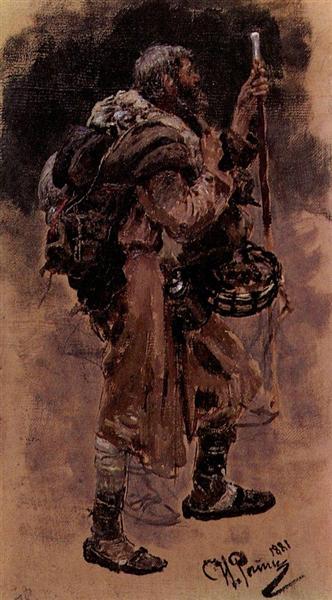Beskrivning
"Vagabond" -målningen (1881) av Ilya Repin uppförs som ett emblematiskt verk som inte bara kapslar in den tekniska färdigheten hos dess författare, utan också en djup reflektion över det mänskliga tillståndet och dess plats inom ett stort känslomässigt och socialt landskap. Valet av titeln antyder en tematisk strategi som går utöver enbart visuell representation; Det förkroppsligar en sökning efter identitet och tillhörighet, återkommande element i Repin, en framträdande representant för den ryska realismen.
Huvudpersonen i målningen är en ensam man, som framträder som en profil före tittaren. Hans ansikte är allvarligt och avslöjar livets spår, medan hans kläder, fattiga och slitna, transporterar oss till perspektivet av en resenär som har rest långt. Bakgrunden, dominerad av en skugga och en dyster landskap, förstärker trampens existensiella tillstånd. De gråa och fruktansvärda tonerna av himmel och jord står i kontrast till den mest subtila paletten i hans figur och skapar en dialog mellan människan och hans miljö som belyser hans ensamhet.
Repin använder Chiaroscuro -tekniken mästerligt, vilket gör att karaktärens volymer kan ritas tydligt mitt i den melankoliska atmosfären som kännetecknar arbetet. Skuggorna är djupa och bidrar till känslan av sorg och övergivande som härstammar från trampen. Denna avsiktliga användning av ljus definierar inte bara formen, utan intensifierar också den känslomässiga resonansen av målningen, vilket gör att tittaren kan känna den belastning som huvudpersonen bär med sig.
När det gäller sammansättning är utrymmet balanserat men asymmetriskt, vilket ger en subtil visuell spänning. Riktningen i vilken trampen ser mot oändlighet antyder en kontemplation av hans öde, hans förflutna kanske eller en osäker framtid. Denna betoning på riktningen för hans blick förbinder tittaren med karaktärens inre berättelse och bjuder in honom att fundera över hans personliga historia och de omständigheter som ledde honom till detta fall av fel.
Själva naturen i arbetet inbjuder dig att reflektera över innebörden av "tramp". I samband med 1800 -talet symboliserar trampens figur de marginaliserade kämpar och repin, känd för sin medkänsla mot de mest missgynnade, lyckas humanisera sin karaktär. Arbetet resonerar med realismens ideal, en konstnärlig rörelse som prioriterar vardagen och sociala problem med de idealiserade teman från tidigare tider.
Ilya Repin är en konstnär som kännetecknas av sin djupa empati gentemot sina undersåtar, oavsett om de är bönder, konstnärer eller vagrants. Påverkan av dess miljö och dess engagemang för de sociala verkligheterna i Ryssland återspeglas i varje penseldrag. Andra repinverk, som "kosackar skriver till Catalina II" eller "Ivan the Freak och hans son", delar också den akuta observationen av mänsklig känsla och det historiska sammanhanget och betonar deras förmåga att fånga betydande och komplexa stunder.
"Tramp" -målningen representerar inte bara en individ utan framkallar också en berättelse som sträcker sig mot den kollektiva upplevelsen av de förflyttade till samhällets skuggor. Genom sin realistiska stil inbjuder Repin tittaren till en introspektion om mänskligheten själv och balanserar estetisk skönhet med en energisk social kommentar som förblir relevant för denna dag. Med sin noggranna inställning till känslor och sammanhang uppförs "Vagabond" som ett mästerverk som varar i konsthistorien och samhällets kollektiva psyke och påminner oss om den mänskliga andens bräcklighet och motståndskraft.
KUADROS ©, en berömd färg på din vägg.
Handgjorda oljemålningar, med kvaliteten på professionella konstnärer och den distinkta tätningen av KUADROS ©.
Bilder reproduktionstjänst med tillfredsställelsesgaranti. Om du inte är helt nöjd med kopian av din målning, återbetalar vi dina pengar 100%.

